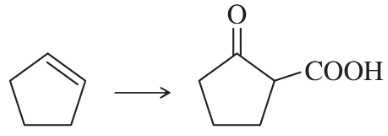Here are the essential concepts you must grasp in order to answer the question correctly.
Electrophilic Addition Reactions
Electrophilic addition reactions are fundamental in organic chemistry, particularly for alkenes and cycloalkenes. In these reactions, an electrophile reacts with a nucleophile, leading to the formation of a more complex molecule. For the synthesis of carboxylic acids from cyclopentene, understanding how electrophiles add to the double bond is crucial for predicting the products.
Recommended video:
Features of Addition Mechanisms.
Oxidation Reactions
Oxidation reactions involve the increase of oxidation state of a molecule, often through the addition of oxygen or the removal of hydrogen. In the context of converting cyclopentene to a carboxylic acid, oxidation is key, as it transforms the alkene into a carbonyl group and subsequently into a carboxylic acid. Recognizing the reagents and conditions that facilitate these transformations is essential for successful synthesis.
Recommended video:
Functional Group Interconversion
Functional group interconversion refers to the process of transforming one functional group into another, which is a common strategy in organic synthesis. In this case, converting an alkene to a carboxylic acid involves multiple steps, including the formation of an intermediate carbonyl compound. Mastery of these transformations allows chemists to design efficient synthetic pathways to desired products.
Recommended video:
Identifying Functional Groups

 Verified step by step guidance
Verified step by step guidance Verified video answer for a similar problem:
Verified video answer for a similar problem:



 3:50m
3:50m